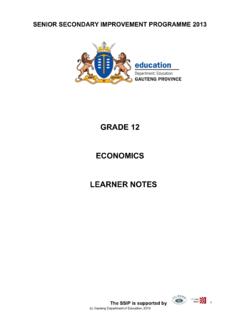Transcription of GRADE 12 BUSINESS STUDIES LEARNER NOTES
1 The SSIP is supported by SENIOR SECONDARY PROGRAMME 201 GRADE 12 BUSINESS STUDIES LEARNER NOTES (c) Gauteng Department of Education, 20131 TABLE OF CONTENTS LEARNER NOTES SESSION TOPIC PAGE 3 1. Legislation skills development act (no. 97 of 1998) 2. Legislation - the national skills development strategy (NSDS) (1/4/2005 31/3/2010) / the human resource development strategy 4 1. Entrepreneurial qualities, success factors and areas of improvements for a BUSINESS venture 2. Human rights, inclusivity and environmental issues 5 1. Insurance 2. Investment (c) Gauteng Department of Education, 20132 GAUTENG DEPARTMENT OF EDUCATION SENIOR SECONDARY INTERVENTION PROGRAMME BUSINESS STUDIES GRADE 12 SESSION 3 ( LEARNER NOTES ) SESSION 3 TOPIC 1: LEGISLATION skills development ACT (NO.)
2 97 OF 1998) LEARNER Note: All legislation is compulsory. Businesses do not have the option of non compliance, but can develop strategies to accommodate legislation. After the Apartheid regime certain labour legislation had to be introduced or revised. You are required to know all the provisions of every Act. Study the NOTES and answer the questions. SECTION A: TYPICAL EXAM QUESTIONS: TOPIC 1 QUESTION 1: 35 minutes 40 marks (DOE Preparatory Exam 2008) HINTS: This is an essay question. Structure is important: Introduction, body and conclusion. Sub-headings are important to use as they count for analysis. Do not write in paragraph style.
3 Use full sentences but in point form. The skills development Act has the potential to change the lives of millions of previously disadvantaged people who were deprived of opportunities in education during the Apartheid era. You are a front-runner for the development of skills as the human resource manager of your company. Convince management about the aims and benefits of this Act and inform them about the purpose and roles of SETAs. [40] QUESTION 2: 5 minutes 8 marks (DOE Nov. 2010) HINTS: The motivation in this question means that you should use examples.
4 2 marks for fact and 1 mark for motivation. How does the National skills development Strategy (NSDS) deal with the shortage of skills in the labour market? Motivate your answer. [8] (c) Gauteng Department of Education, 20133 GAUTENG DEPARTMENT OF EDUCATION SENIOR SECONDARY INTERVENTION PROGRAMME BUSINESS STUDIES GRADE 12 SESSION 3 ( LEARNER NOTES ) TOPIC 2: LEGISLATION - THE NATIONAL skills development STRATEGY (NSDS) (1/4/2005 31/3/2010) / THE HUMAN RESOURCE development STRATEGY SECTION A: TYPICAL EXAM QUESTIONS: TOPIC 2 QUESTION 1: 10 minutes 10 marks (DOE Nov.)
5 2008) HINTS: The examples that are required are the names of any 2 SETAs. The following questions are based on SETA (Sector Education and Training Authority): Explain the contribution of SETAs towards ensuring that quality skills development takes place. Illustrate by using any TWO examples. (8) Describe how SETAs are funded. (2) [10] QUESTION 2: 20 minutes 20 marks (DOE Preparatory 2008) HINTS: You need to know the % contribution by BUSINESS towards the SDL in order to calculate the amount in Q Zandile was awarded a license to extract timber from the Ngodini forest near Nelspruit.
6 She uses 100 trucks to transport the timber and has 1 500 employees. The monthly salary and wage bill of Zandile's BUSINESS is R6 400 000. The factory processes the timber into semi-finished products in the form of planks which are sold to furniture manufacturers as well as the building industry. Does Zandile s BUSINESS qualify for paying the skills development levy ? Motivate. (5) Use the information above to calculate the amount that Zandile's factory will pay for skills levy every month. (Show ALL the calculations.) (4) Explain the procedures to be followed if a dispute arises between Zandile s BUSINESS and the SETA.
7 (10) To which economic sector would the extraction of timber be classified? (1) [20] (c) Gauteng Department of Education, 20134 GAUTENG DEPARTMENT OF EDUCATION SENIOR SECONDARY INTERVENTION PROGRAMME BUSINESS STUDIES GRADE 12 SESSION 3 ( LEARNER NOTES ) QUESTION 3: 10 minutes 10 marks (Various sources) Discuss the objectives of The National skills development Strategy. [10] SECTION B: ADDITIONAL CONTENT NOTES : TOPIC 1 Purpose of the skills development Act is to: develop the skills of the South African workforce.
8 Encourage employers to: use the workplace as an active learning environment. provide employees with the opportunities to acquire new skills . provide opportunities for new entrants to the labour market to gain work experience employ persons who find it difficult to be employed. encourage workers to participate in learnerships and other training programmes. ensure quality of education and training in the workplace. assist work seekers to find employment, retrenched workers to re-enter the labour market and employers to find qualified employees. improve the employment prospects of persons previously disadvantaged by unfair discrimination, and to redress those disadvantages through education and training.
9 Improve the quality of life of workers as well as career possibilities. improve productivity in the workplace and the competitiveness of employees. promote self-employment. improve the creation of social services. increase the levels of investment in education and training in the labour market and to improve the return on that investment. provide and regulate employment services. Paying the skills development levy An employer must pay a skills development levy of 1% of the total amount paid in salaries to employees every month, if: the employer has registered the employees with SARS and/or the employer pays over a certain threshold per annum ( R500 000 as of June 2010) in salaries and wages to their employees.
10 The levies paid to SARS are put in a special fund. 20% of this fund will be paid into the National skills Fund. The National skills Fund is administered by the Director General. The National skills Fund will fund skills development projects that don t fall under SETAs. (c) Gauteng Department of Education, 20135 GAUTENG DEPARTMENT OF EDUCATION SENIOR SECONDARY INTERVENTION PROGRAMME BUSINESS STUDIES GRADE 12 SESSION 3 ( LEARNER NOTES ) Who is exempt from payment of SDL? Public service institutions Religious or charity organisations Public entities that get more than 80% of their money from Parliament Employers: whose total pay to all its workers is less than R500 000 per 12 month period who do not have to register according to the Income Tax Act.







![FORM B NOTICE OF INTERNAL APPEAL [Regulation 8]](/cache/preview/a/0/a/7/3/c/7/0/thumb-a0a73c70e115f1c5cc7bd639b8e458e6.jpg)







![Skills Development Levies Act [No 9 of 1999]](/cache/preview/e/8/8/9/0/9/5/f/thumb-e889095f2851a12d7a402b625825ab7f.jpg)
